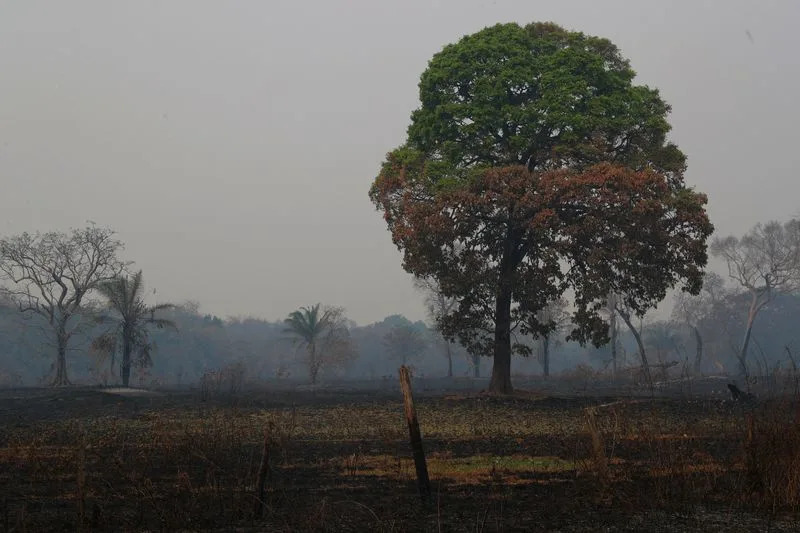AFP
Wed, November 15, 2023
The Pantanal wetlands in western Brazil are famed as a paradise of biodiversity, but these days they have enormous clouds of smoke billowing over them, as raging wildfires reduce vast expanses to scorched earth.
Known for its lush landscapes and vibrant wildlife, including jaguars, caimans, macaws and monkeys, the Pantanal is home to the world's biggest tropical wetlands and, in normal times, a thriving ecotourism industry.
But in recent weeks it has been ravaged by fires that are threatening its iconic wildlife, as Brazil suffers through a southern hemisphere spring of droughts and record heat.
There were 2,387 fires in the Pantanal in the first 13 days of November, an increase of more than 1,000 percent from the entire month of November 2022, according to satellite monitoring by Brazilian space research agency INPE.
"The situation is completely out of control. And between the heat wave and the wind, it's only going to get worse," says biologist Gustavo Figueiroa, 31, head of the environmental group SOS Pantanal.
"The Pantanal is a region that's used to fires. Normally, it regenerates naturally. But this many fires isn't normal."
The Pantanal sits at the southern edge of the Amazon rainforest, stretching from Brazil into Bolivia and Paraguay across more than 170,000 square kilometers (65,000 square miles).
It has been hit hard by drought this year, with normally flooded areas reduced to shriveled ponds.
At one such spot along the dirt highway across the region, the 150-kilometer (95-mile) "Transpantaneira," a small group of caimans can be seen trying to swim in the shallow water.
Nearby, the corpse of another sits rotting on the bank.
Elsewhere, a dead porcupine lays on a carpet of ash in the charred remains of what was once a forest.
"It probably died of smoke inhalation," says veterinarian Aracelli Hammann, who is volunteering with a wildlife rescue group.
They made the grim find in the Encontro das Aguas park, home to the world's largest jaguar population.
Nearly one-third of the park has been hit by fires in the past month, according to environmental group ICV.
The other main front that firefighters are battling is in the Pantanal National Park to the southwest, where fires have burned 24 percent of the surface area.
Figueiroa warns the two fire fronts "are about to merge."
Exacerbating the situation, firefighters face huge logistical battles, given that many hard-hit areas are only reachable by boat.
- 'Domino effect' -
Experts say the fires are mainly caused by human activity, especially burning land to clear it for farming.
Climate conditions have only made things worse.
Experts say even when animals survive the flames, they risk starvation.
"We've seen a range of dead animals, including insects, reptiles, amphibians, small mammals, which are unable to flee," says Figueiroa.
"They're part of an invisible food chain, and each death has a domino effect, reaching all the way up to the apex predator, the jaguar."
In a clearing, a group of monkeys rushes to devour bananas and eggs left for them by volunteers.
"We call it 'gray hunger' -- when fire reduces all the vegetation to ashes and there are no natural food sources left in the area for animals that survive the flames," says Jennifer Larreia, 33, head of animal rescue group E o Bicho.
In 2020, when wildfires also devastated the region, her organization provided 300 tonnes of fruit for animals in five months.
Fires in Brazil's Pantanal wetland surge to November record on lack of rain
Reuters
Tue, November 14, 2023


An aerial view shows burnt trees near a river in The Pantanal, the world's largest wetland, in Pocone
BRASILIA (Reuters) - The number of fires in Brazil's Pantanal, the world's largest wetland, surged in the first few days of November, breaking the record for the month since monitoring began in 1998, data from space research agency Inpe showed on Tuesday.
The 2,387 fires recorded by Inpe in early November is already more than double October's figure and more than half of the total fires seen this year so far. On Sunday, Inpe detected 706 active fires.
Fires have more than tripled in the Pantanal compared with 2022, which was mild compared with the two previous years.
Weather experts point to the El Nino phenomenon, aggravated by climate change, as being behind the sharp increase in fires.
Normally, the region starts to receive rains at the end of September, said Vinicius Silgueiro, a coordinator at the Centro de Vida Institute.
"We're having a very unusual November with the climate change situation and the effects of El Nino: very high temperatures at a time when we would have already had rain and higher air humidity," he said.
"There was sporadic rainfall at the end of October, but two or three days after it stopped, the fires came back," he added.
Historically, November averages 442 hotspots. The previous record for the month, set in 2002, was 2,328.
Last Saturday, the federal government redoubled firefighting efforts in the region, bringing its team tackling the blazes to nearly 300, while also adding four aircraft.
"Much of the area that had burned in 2020 is burning again. These are areas that had just started natural regeneration," Silgueiro said, explaining that burned soil is very fragile, which hinders its recovery.
"The government has to prepare for a recurring risk as a result of the climate crisis, which requires measures to prepare, prevent and respond. Even more so in a biome that has lost 57% of its surface water since 1985," he said.
(Reporting by Lisandra Paraguassu; Editing by Gerry Doyle)
No comments:
Post a Comment